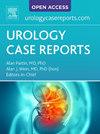Post-operative pre-sacral hematoma after percutaneous nerve evaluation: A case report
IF 0.4
Q4 UROLOGY & NEPHROLOGY
引用次数: 0
Abstract
Sacral neuromodulation (SNM) is an effective treatment for refractory urinary conditions, including urge incontinence and urinary retention. Percutaneous nerve evaluation (PNE) is used to assess patient suitability for permanent SNM through temporary lead placement. While rare, complications such as hematomas can occur. This case report describes an acute pre-sacral hematoma following PNE lead placement in the absence of typical risk factors. Awareness of such rare complications can improve preparedness for management of potential adverse outcomes.
经皮神经术后骶前血肿评价1例
骶神经调节(SNM)是一种有效的治疗顽固性泌尿系统疾病,包括急迫性尿失禁和尿潴留。经皮神经评估(PNE)用于评估患者是否适合通过临时导线置入永久性SNM。虽然罕见,但会发生血肿等并发症。本病例报告描述了在没有典型危险因素的情况下,PNE铅置入后的急性骶前血肿。对这些罕见并发症的认识可以提高对潜在不良后果管理的准备。
本文章由计算机程序翻译,如有差异,请以英文原文为准。
求助全文
约1分钟内获得全文
求助全文

 求助内容:
求助内容: 应助结果提醒方式:
应助结果提醒方式:


